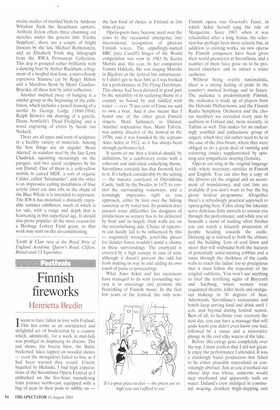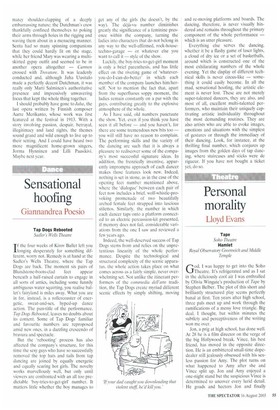Finnish fireworks
Henrietta Bredin
T seem to have fallen in love with Finland. 1 This has come as an unexpected and delightful act of bouleversal by a country which, admittedly, for a week in mid-July was prodigal in displaying its charms. The sun shone, the breeze blew, the Baltic beckoned, lakes lapped on wooded shores — even the mosquitoes failed to bite as I had been warned they would. Utterly beguiled by Helsinki. I had high expectations of the Savonlinna Opera Festival as I embarked on the five-hour meandering train journey north-east, equipped with a bag of peas in their pods to nibble on —
the fast food of choice in Finland at this time of year.
Opera-goers have become used over the years to the occasional emergence into international recognition of glorious Finnish voices. The appallingly-named BBC (née Cardiff) Singer of the World competition was won in 1983 by Karita Mattila and, this year, by her compatriot Tommi Hakkala. He was singing Marullo in Rigoletto at the festival but unfortunately I didn't get to hear him as I was booked for a performance of The Flying Dutchman. This choice had been dictated in good part by the suitability of its seafaring theme in a country so bound by and riddled with water — over 70 per cent of Finns are said to own a boat. And it also meant that I heard one of the other great Finnish singers, Matti Salminen, as Daland. Another stupendous bass, Marti Talvela, was artistic director of the festival in the 1970s, and it was founded by the soprano Aino Ackte in 1912, so it has always been strongly performer-led.
It seems to me that a festival should, by definition, be a celebratory event, with a coherent and individual underlying theme. Savonlinna certainly has that firework feel to it. It's helped considerably by the setting — the massive courtyard of Olavinlinna Castle, built by the Swedes in 1475 to control the surrounding waterways, and a loomingly impressive sight as you approach, either by foot over the linking causeway or by water taxi. Its position does present some difficulties for designers of productions as scenery has to be delivered by boat and its hugely thick walls are on the overwhelming side. Choice of repertory can hardly fail to be influenced by this — exquisitely wrought, jewel-like pieces for slender forces wouldn't stand a chance in these surroundings. The courtyard is covered by a high canopy in case of rain, although it doesn't prevent the odd bat from making its way in and adding its own touch of panic to proceedings.
What Aino Ackte and her successors have managed to do with resounding success is to encourage and promote the flourishing of Finnish music. In the first few years of the festival, the only non Finnish opera was Gounod's Faust, in which Ackte herself sang the role of Marguerite. Since 1967, when it was relaunched after a long hiatus, the selection has perhaps been more eclectic but, in addition to existing works, six new operas by Finnish composers have been given their world premieres at Savonlinna, and a number of them have gone on to he produced elsewhere and to attract a wider audience.
Without being overtly nationalistic, there is a strong feeling of pride in the country's musical heritage and its future. The audience is predominantly Finnish, the orchestra is made up of players from the Helsinki Philharmonic and the Finnish Radio Symphony Orchestra and the chorus members are recruited every year by audition in Finland and, more recently, in Tallinn as well. This makes for an endearingly youthful and enthusiastic group of singers, which they did rather need to be in the case of the Dutchman, where they were obliged to do a great deal of running and roistering (male) supplemented by spinning and sympathetic swaying (female).
Operas are sung in the original language with, where necessary, surtitles in Finnish and English. You can also buy a copy of the libretto (in the original and an assortment of translations), and cast lists are available if you don't want to buy the big glossy festival programme. Altogether there's a refreshingly practical approach to opera-going here. Cafés along the lakeside serve delicious fishy morsels to sustain you through the performance, and while you sit beneath a stand of rustling silver birches you can watch a leisurely procession of people heading towards the castle. Dressing up is tailored to both the climate and the building. Lots of cool linen and shoes that will withstand both the hazards of potentially ankle-turning cobbles and a route through the thickness of the castle walls to reach the ladies' too so precipitous that it must follow the trajectory of the original oubliette. You won't see anything to rival the terrifying sights of Bayreuth and Salzburg, where women wear sequinned sheaths, killer heels and orangetan makeup in 30 degrees of heat. Afterwards, Savonlinna's restaurants and hotels keep serving food and drink until 1 a.m. and beyond during festival season. Best of all, to facilitate your recovery the next day, you can have a massage that will undo knots you didn't even know you had, followed by a sauna and a restorative plunge in the cool silky waters of the lake.
Before this eulogy goes completely over the top. I must confess that I did not greatly enjoy the performance I attended. It was a clunkingly banal production that failed to be either plausibly naturalistic or convincingly abstract. Just as you'd worked out whose ship was whose, someone would step overboard and apparently walk on water. Daland's crew indulged in communal swaying, drunken thigh-slapping and matey shoulder-clapping of a deeply embarrassing nature; the Dutchman's crew thankfully confined themselves to poking their arms through holes in the rigging and waving them about in a menacing manner. Senta had so many spinning companions that they could hardly fit on the stage, while her friend Mary was wearing a multiskirted gypsy outfit and seemed to be in another opera altogether — Carmen crossed with Trovatore. It was leadenly conducted and, although Juha Uusitalo made a perfectly decent Dutchman, it was really only Matti Salminen's authoritative presence and impressively unwavering focus that kept the whole thing together.
I should probably have gone to Juha, the last opera written by Finnish composer Aarre Merikanto, whose work was first featured at the festival in 1913. With a story involving passion, despair, betrayal, illegitimacy and land rights, the themes sound grand and wild enough to live up to their setting. And I could have heard two more magnificent home-grown singers, Jorma Hynninen and Lilli Paasikivi. Maybe next year.











































































 Previous page
Previous page